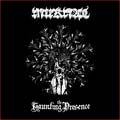SHRAP (in) - We Shall Arise (2015)

Label : Auto-Production
Sortie du Scud : 1er juillet 2015
Pays : Inde
Genre : Crossover
Type : EP
Playtime : 4 Titres - 12 Mins
Y a-t-il du nouveau à l'Est ? Si j'en crois le nombre de projets asiatiques qu'on nous demande régulièrement de chroniquer, il semblerait bien que oui. Illustration aujourd'hui avec le quatuor indien SHRAP. Avec son étrange logo indianisé par l'ajout d'une tête de vache sacrée dont les cornes forment la barre du A, ce groupe de Crossover originaire de Calcutta a été fondé par Saptak en 2011. Le vocaliste, auteur-compositeur et guitariste rythmique du gang est le seul survivant de la formation initiale, ANTIMSANSKAR. Il est accompagné de Rudra Sarkar (lead guitare), Subhajit Bhowmick (basse) et Dipanjan Dey (batterie). En quatre ans, le groupe a assuré pas moins de 87 shows et sorti deux EP.
Initialement conçu comme un single autour de la chanson titre, We Shall Arise est un EP coup de poing. En moins de 15 minutes, il donne un aperçu de ce dont le combo est capable. La tracklist s'ouvre avec une bonne petite intro instrumentale évocatrice. C'est le résidu d'un projet de cover de la chanson Punishment de BIOHAZARD, réduite sur l'opus à une ouverture instrumentale. C'est court, mais ça va droit au but, avec un son compressé très proche de son modèle, un beau travail sur la batterie et un crescendo qui met la patate. Petite baisse de régime avec "Torture" et "Fuck Them" deux chansons assez similaires qui auraient pu être plus méchantes si elles n'étaient pas écrasées par d'interminables intros d'ambiance à la limite du hors sujet sur un disque aussi court (sur "Torture", l'intro en préamp dure aussi longtemps que la partie chantée!). Ce défaut mis à part, ces deux morceaux fleurent bon le Crossover à la IRON REAGAN. C'est direct, c'est méchant, ça chante vite, ça ne vole pas très haut mais ça donne la pêche. La chanson titre "We Shall Arise" vient clôturer le projet. C'est un morceau plus construit. Il démarre avec une belle ouverture à la guitare, une rythmique plus travaillée et offre un meilleur équilibrage entre musique et chant.
La musique, très compressée, fleure bon le Thrash de PRONG. Une rythmique pachydermique, une batterie sous amphétamines mais sans folie (elle se contente de balancer du BPM) et un lead guitare qui crunche joliment. C'est le chant de Saptak qui vient donner sa touche Punk Hardcore au projet. Un screaming très grave, plutôt bourrin et un effroyable accent anglais. Les lyrics sont le parent pauvre de la galette. Dire que ça ne vole pas très haut est un doux euphémisme. Certes, quand on pogote dans le pit, on se fout un peu des paroles, mais si le groupe veut devenir autre chose qu'un animateur de soirées furieuses, il faudrait faire un petit effort pour proposer autre chose que trois phrases par chanson avec des rimes de mirliton et une répétition épileptique du titre pour masquer la vacuité du propos... Cette affligeante banalité est comme surlignée par le frontman dont les intonations de grosse brute donnent au projet un côté bas du front prononcé.
We Shall Arise est une demi réussite. L'EP montre que SHRAP en a sous le capot et dispose d'arguments pour mettre le feu en live. Mais en mode studio, si tous les ingrédients d'un bon disque sont réunis, il faudrait un peu revoir le dosage. A défaut de révolutionner le genre, le projet des indiens a au moins le mérite de nous offrir un sympathique aperçu de Metal asiatique.
Ajouté : Mardi 15 Septembre 2015
Chroniqueur : Rivax
Score :   
Lien en relation: Shrap Website
Hits: 7184
|














